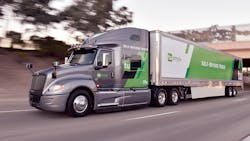Navistar plans to launch truly driverless Class 8 trucks by 2024
Navistar and TuSimple are teaming up to make truly driverless Class 8 trucks a reality on U.S. highways by the middle of the decade.
The two companies, which have been working together for the past two years, announced on July 15 a strategic partnership to co-develop SAE Level 4 self-driving Class 8 tractors for production by 2024. Navistar, which makes International brand trucks and IC Buses, also took a minority stake in TuSimple, a self-driving technology company founded in 2015.
Navistar plans to launch the driverless technology on its International LT Series tractor for fleets operating in the Southwest for routes between distributions centers. “We’re focusing on on-highway vehicles that spend a vast majority of their time — 95% of the time — just pounding away the miles with very little surface street driving and nothing in an urban environment,” Chris Gutierrez, Navistar’s chief engineer for advanced driver assistance systems, told FleetOwner. “We’re just talking about getting off the highway, going to your local distribution center, which in most cases are one or two turns off the interstate.”
Gutierrez said there would be no human in the cabs as they drive from Point A to Point B. Operators at distribution centers would prepare the tractors and trailers for their journey. “There will be a variety of training necessary for launching, receiving and the type of inspections that will be necessary to ensure the vehicle is in good standing before launching,” he explained. “As you can imagine, there will also be training necessary for service facilities wherever we fuel the vehicle and any type of recovery type operations that will need to be in place.”
Both Navistar and TuSimple are working with government regulators and industry consortiums to clarify existing legislation across the country in advance of humanless trucks rolling down the highway. Another step is public acceptance of heavy-duty vehicles running without a driver behind the wheel. The first step toward that acceptance, Guitierrez said, is this announcement, that Navistar is buying into the future of freight transportation.
“We are buying into a partnership to bring this safe and quality product to market,” he said. “That's really the first step — just to get people thinking that this a real thing. It's not just a startup thing anymore. And over the next couple of years, as we make advances in our project, as regulations come online, we’ll continue to roll out this message to the public and to the regulators: This is going to be done in a way that is safe and is going to advance our customers and the industry and will make the transportation of goods that much better overall.”
TuSimple and Navistar are already working to fully integrated this Level 4 engineering solution for mass production. Customers will be able to purchase the fully autonomous trucks through Navistar’s traditional sales channels in the U.S., Canada and Mexico. Production, Gutierrez said, will be based on demand. However, he added that his company wouldn’t embark on a project of this magnitude without expecting to meet or exceed the costs of development and production.
“TuSimple and Navistar began joint development of pre-production units in 2018 and now we are kicking-off a full go-to-market production program,” said TuSimple president Cheng Lu. “We are honored to be partnered with Navistar. The investment in TuSimple and the partnership with Navistar marks an important milestone for our company. With the combined expertise of Navistar and TuSimple, we have a clear path to commercialize self-driving Class 8 trucks at scale.”
Earlier this year, TuSimple launched the first Autonomous Freight Network (AFN), an ecosystem consisting of autonomous trucks, digitally mapped routes, strategically placed terminals, along with TuSimple Connect, the company’s autonomous operations monitoring system. The AFN will run through Arizona, New Mexico and Texas by 2021. TuSimple plans to expand the network from Los Angeles to Florida — with hubs in other Southern states — by 2023 before expanding to Northern states and cities by 2024.
The AFN integrates with existing logistics networks and transportation management systems to enable long-haul autonomous freight operations. A 2019 study by TuSimple and the University of California-San Diego found autonomous trucks were 10% more fuel efficient than human-driven trucks. The self-driving vehicles could also operate without hours of service limitations.
TuSimple already operates a fleet of 40 self-driving trucks in the U.S., shipping freight autonomously for UPS and McLane Co. in the Southwest. The tech company plans to demonstrate completely driverless operations in 2021.
“Autonomous technology is entering our industry and will have a profound impact on our customers’ businesses,” according to Navistar president and CEO Persio Lisboa. “Navistar’s strategic partnership with TuSimple positions us to be a leader in developing solutions for our customers by leveraging our organizations’ collective expertise to integrate our vehicle design and systems integration capabilities with TuSimple’s innovative autonomous technology. This announcement marks a significant milestone in our development journey with TuSimple and we look forward to furthering our relationship in the months to come.”
Furthering that relationship will involve a lot of work in the months and years ahead for Gutierrez and his team. “Today, drivers make most of the decisions — in fact, all of the decisions,” he said. “Tomorrow, the truck is going to make those decisions, and yes, we're going to tell the truck how to make those decisions, but we need to write that down and ensure that the truck is able to execute our thoughts that we typically do subconsciously.”
About the Author
Josh Fisher
Editor-in-Chief
Editor-in-Chief Josh Fisher has been with FleetOwner since 2017. He covers everything from modern fleet management to operational efficiency, artificial intelligence, autonomous trucking, alternative fuels and powertrains, regulations, and emerging transportation technology. Based in Maryland, he writes the Lane Shift Ahead column about the changing North American transportation landscape.

